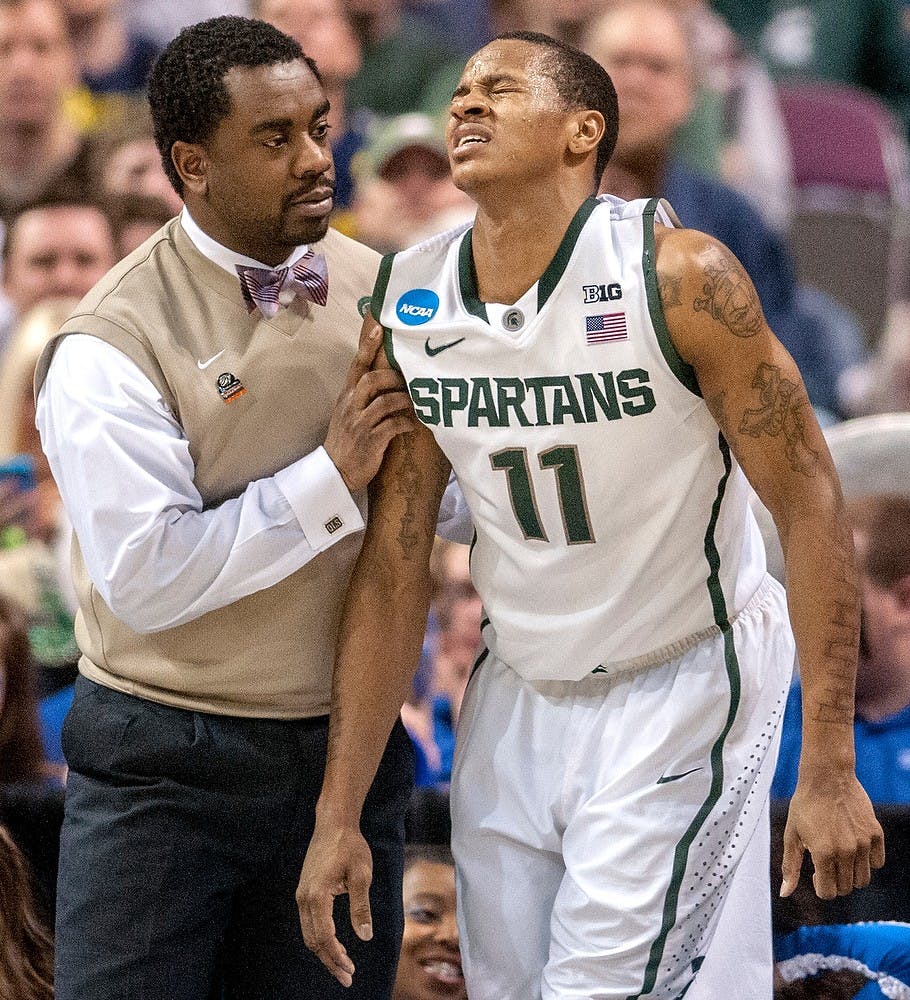The questions didn’t stop.
He’d heard them all day, but when the count reached six straight on that same subject, Keith Appling paused and couldn’t help but chuckle.

Athletic trainer Quinton Sawyer helps junior guard Keith Appling to get up from the floor after Appling injuired himself during the second half during the third round of the NCAA Tournament on Saturday at The Palace of Auburn Hills in Auburn Hills, Mich. Justin Wan/The State News
The questions didn’t stop.
He’d heard them all day, but when the count reached six straight on that same subject, Keith Appling paused and couldn’t help but chuckle.
“All these questions are going to be about my injuries and stuff,” the junior guard said with a laugh.
Appling’s humor with the line of questioning is understandable.
With a re-aggravated shoulder injury from earlier in the season and recurring knee tendinitis, Appling’s first bout with injuries in his life is coming at an inopportune time as the No. 3 seed MSU men’s basketball team (27-8) prepares for a Sweet 16 matchup with No. 2 seed Duke (29-5) in Indianapolis on Friday (9:45 p.m., CBS).
“It’s really irritating,” Appling said. “Every time I move a certain way, I get a sharp pain, but it’s basketball. These types of things tend to happen, so I’ve just got to fight through it.”
It’s a mindset built into the sporting culture and defined for Appling by Detroit, the city he grew up in, and the program he plays for.
Toughness is admired above almost all else, and with one step onto the court, 100 percent health is assumed and excuses aren’t tolerated.
That philosophy is personified by the Spartans’ head coach and built, in part, by the rugged determination of former guard Mateen Cleaves, whose shadow always will hang over the program.
“When Cleaves came out of (the 2000 national championship) game a few years ago, he threatened me to put him back in, and that’s the only reason I did,” MSU head coach Tom Izzo said.
“(Appling’s) as tough as Cleaves … maybe we’ll keep him out of some drills this week that are more physical.”
The experience with Cleaves is what led Izzo to say the Spartans’ junior must use his body language to help his head coach feel comfortable playing him.
But comfort hasn’t been easy for Appling to find of late.
He began wearing a shoulder brace in practice this week on trainer’s orders, and said it affected his shooting before adjusting to it toward the end of practice.
Although admitting to some paranoia about experiencing the excruciating pain of his shoulder popping out again, Appling said he’d prefer to play without the brace, but doesn’t think he’ll get his wish.
“Hopefully, our trainer changes his mind, and I’m able to play without it,” Appling said.
Once he steps on the court, in his mind, he’s healthy — even if the medical report says differently.
“I’m fine, at least I feel fine,” he said. “It aches here and there, but I mean, it’s not going to stop me from playing, so I don’t look at it as that serious.”
Support student media! Please consider donating to The State News and help fund the future of journalism.